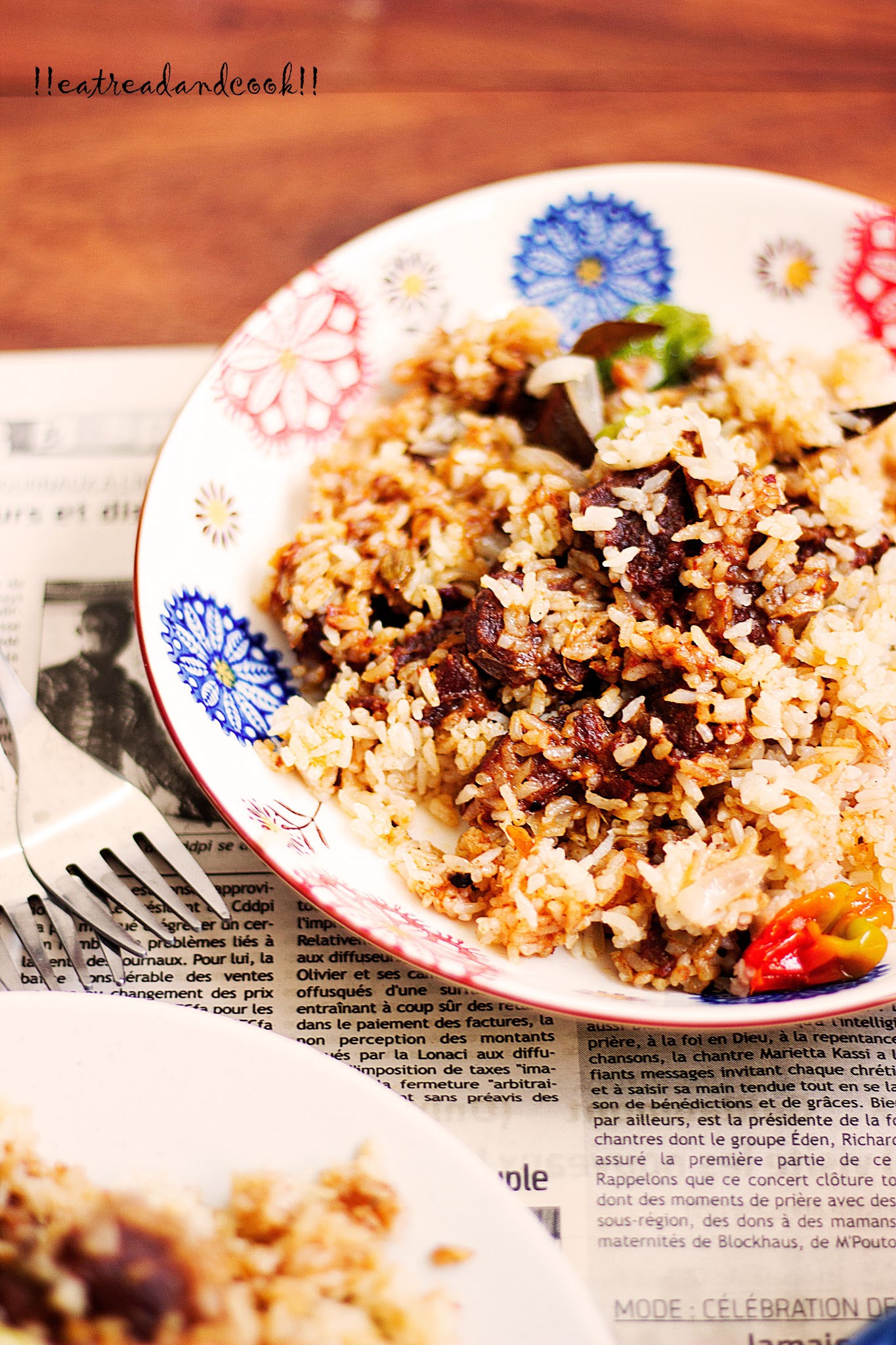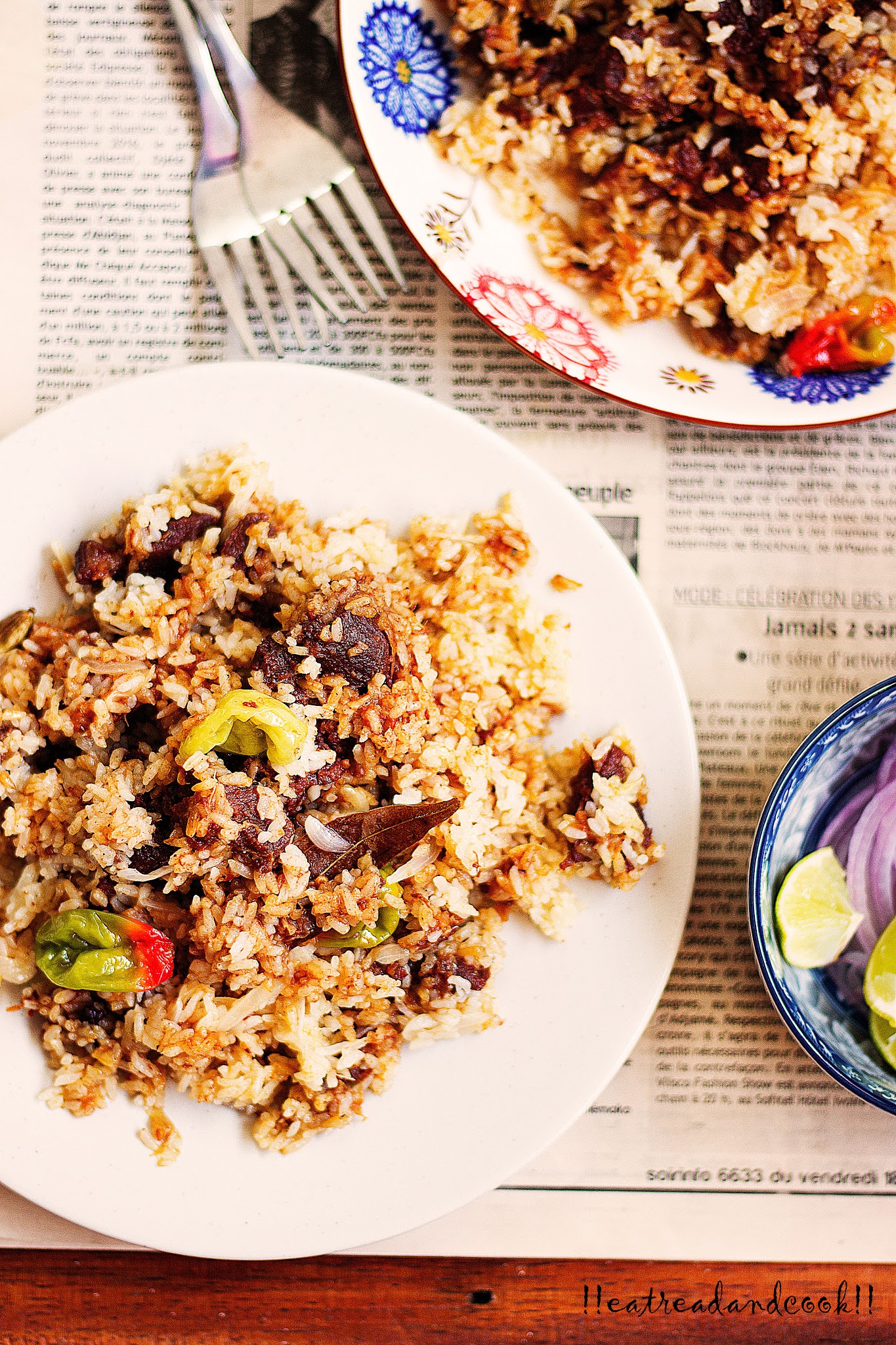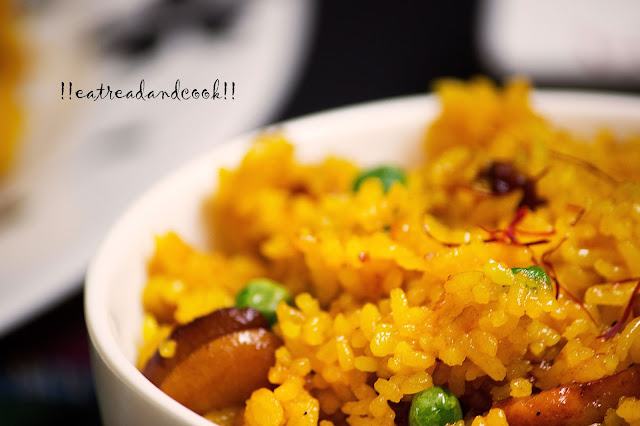Bangladeshi Mutton Tehari
It had been over 2 years
that I have given up eating rice in my daily diet. I eat rice only on Sundays
with smirky chicken or mutton curry and that is that. But my love for Biryani
and Pulao could not end in that way...so most of the Sundays I prepare Biryani
or Pulao, so that I don’t miss a thing.
One glance through the
recipe of Tehari and it appears more of a Bangladeshi version of Mutton Yakhni
Pulao...but you need to cook Tehari to break out of that misconception!! The
flavour of Tehari comes from using those whole green chillies...which gets
cooked on dum and imparts a very distinct flavour.
It is a lengthy
process...I agree, but all your effort will pay off when you will have that
first whiff of smell upon opening the lid of the pot for the first time. Totally loving it!!
Bangladeshi Mutton Tehari
Serves 6
Ingredients:
For the mutton:
1 kg boneless mutton – cut
into small bite size pieces
2 large onions – sliced
8 fat cloves of garlic –
paste
2 and ½ inch ginger –
paste
15-20 green chillies
1 cup of thick yogurt –
whisked
Ground mace and nutmeg –
1tbsp (do not dry roast)
3 medium cinnamon sticks
4 green cardamoms
4 cloves
2 large bay leaves
10-12 black peppercorns
1 tbsp cumin powder
1 tsp red chilli powder
1 tbsp garam masala powder
Juice of 1 lime
½ cup of pure virgin
mustard oil
For the rice:
3 cups of rice (I have
used Gobindobhog rice. Traditionaly Bangladeshis use a short grained fragrant
rice, which they refer as the “Polao er Chal” – The rice for Pulao. But you can
use Basmati in case of unavailability.)
½ cup of pure desi ghee
2 medium cinnamon sticks
3 green cardamoms
3 cloves
2 bay leaves
6-8 black peppercorns
1 large onion – sliced
1 inch ginger – paste
4 garlic cloves – paste
1 tsp kewra / screwpine
water
15-20 whole green chillies
Salt to season the rice
Method:
Prepare the mutton:
Prepare the marinade by
mixing the yogurt, nutmeg and mace powder, half of the ginger-garlic paste,
cumin powder, red chilli powder, garam masala powder, lime juice and salt with the
boneless mutton pieces.
Let them marinade for an
hour or two.
After the mutton is
marinated, heat the mustard oil in a pressure cooker.
Temper the oil with cinnamon
sticks, green cardamoms, cloves, bay leaves and black peppercorns.
Sauté for half a minute or
until the air feels aromatic.
Add the sliced onions into
the hot oil and sprinkle some salt and sugar over them.
Stir and cook the onions
until they turn a little bit golden.
Add the remaining ginger-garlic
paste to the onions and cook them for a minute or two more or until the raw
flavour of the garlic is gone.
Add the marinated mutton
inside the pressure cooker and cook them until the mutton pieces change their
colour.
You can stop here and cook
the mutton on pressure or you can slow cook for another half an hour or so or
until all moisture evaporates.
Stir every 2 or 3 minutes
so that they do not stick to the bottom of the pressure cooker.
When the moisture
evaporates and you can see the oil separating at the edges, add 2 cups of water
or enough water to submerge all the mutton pieces and close the lid of the
pressure cooker.
Cook on medium to low heat
until the cooker blows aroung 12-15 whistles or the mutton is fork tender. The
quality of meat differs from place to place, so cook your mutton until it
becomes soft and succulent.
Switch off the flame now
and let the pressure escape.
After the pressure settles
down open the lid of the cooker and place it on the stove top again.
Switch the flame to medium
to high and simmer the curry until it thickens and the oil starts to separate.
The curry should be thick and non-watery as it can make the rice of the tehari
soggy.
Place the cooked mutton in
a corner now and prepare the rice.
Prepare the rice:
Wash the rice in water
until clear water runs through.
Soak the rice in water for
half an hour and drain the water. Keep the rice aside in a strainer so that the
excess water can drip off.
Take a heavy bottomed
cooking pot or the one in which you cook biryani or pulao.
Heat the ghee and the
cinnamon sticks, green cardamoms, cloves, bay leaves and black peppercorns.
Sauté for half a minute
and add the sliced onions.
Stir and cook the onion
until they turn lightly golden and then add the ginger-garlic paste.
Cook for a minute more
before adding the rice.
Add the washed, soaked and
drained rice into the pot with onions and start stirring the rice. Fry the rice
until you see the rice grains separated and non-sticky.
Add water, double the
amount of rice.
Add salt to season the
rice and give them a good stir. You need to properly season the water or
otherwise the rice will taste bland.
Do not cover the pot and
let the water come to a boil.
When the water starts to
boil, you take the curry and the mutton pieces and layer them on top of the
rice.
Drizzle the screwpine /
kewra water on the mutton pieces and scatter the whole green chillies over
them.
Cover the lid tightly and
switch the flame to the lowest. You can seal the edges with whole wheat flour
dough, or you can do what I do, I cover the mouth of the pot nicely with
aluminium foil and then close it with the lid.
Place a tawa over the
flame and place the pot of tehari over it.
Cook on dum for about 45
minutes and then switch off the flame.
Let the pot sit like that
for another 15 minutes and take it off the stovetop.
Open the lid only when you
are ready to serve.
Serve with lime wedges,
sliced onions, cucumber and a chilled bowl of raita.















Comments
Post a Comment